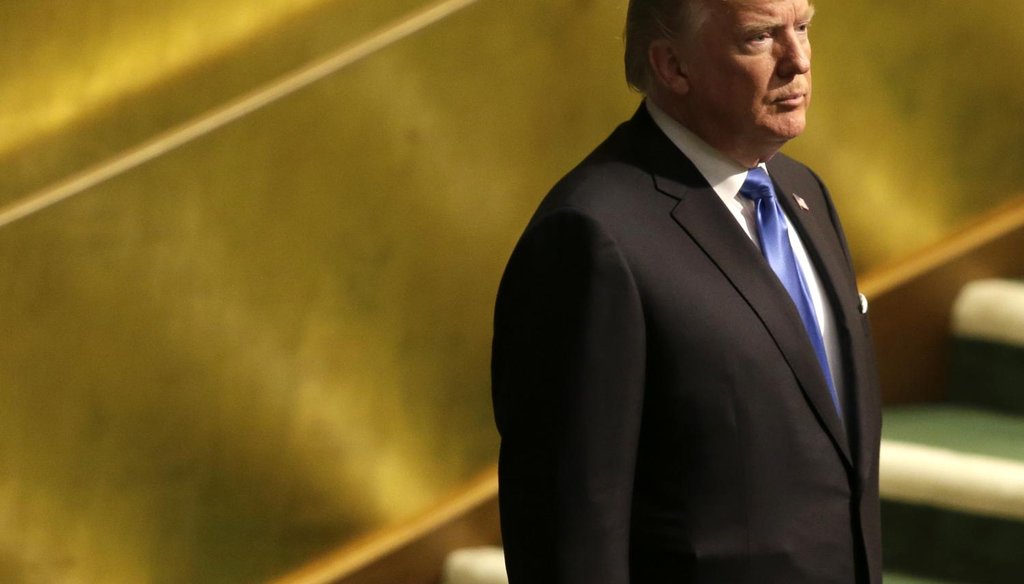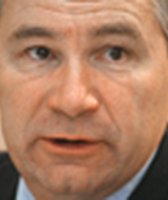Stand up for the facts!
Our only agenda is to publish the truth so you can be an informed participant in democracy.
We need your help.
I would like to contribute

United States President Donald Trump prepares to speak during the United Nations General Assembly at U.N. headquarters Sept. 19, 2017. (AP)
President Donald Trump threatened to "totally destroy" North Korea and called Iran a "rogue state whose chief exports are violence, bloodshed and chaos," during an address to the United Nations General Assembly.
Trump denounced North Korean leader Kim Jong Un — who he dubbed "Rocket Man"— and said Pyongyang’s pursuit of an enhanced nuclear weapons program "threatens the entire world with unthinkable loss of human life."
"The United States has great strength and patience," Trump said Sept. 19, 2017. "But if it is forced to defend itself or its allies, we will have no choice but to totally destroy North Korea. Rocket Man is on a suicide mission for himself and for his regime."
Trump’s speech reinforced the America First ethos from the campaign trail, while appealing for the world’s nations to cooperate on areas of mutual interest. Here’s our review of some of his claims.
This is actually an understatement by Trump, whose administration drafted an executive order that would cut U.S. payments to the United Nations by as much as 40 percent.
Sign up for PolitiFact texts
The current U.N. regular budget calls for $5.4 billion over two years. By a formula based on the size of a country’s economy and other factors, the U.S. assessment is set at 22 percent, or the U.N.’s maximum contribution cap.
That comes to about about $1.2 billion, which is what the United States provided to the U.N. over two years based on the last Obama administration budget. It’s also more than any other country pays.
But that’s just for the regular budget. There are over a dozen other U.N. agencies and operations that American dollars also support, including a total of about $2.2 billion a year toward peacekeeping activities.
The U.S. Constitution, signed on Sept. 17, 1787, is broadly considered the world’s longest surviving national constitution, according to Dr. Steven Frank, the Constitution Center’s chief historian. We’ve previously rated a similar statement Mostly True.
However, many other countries don’t follow a single constitution but instead operate under what historians call a "multi-text approach," in which national laws are based on different documents and statutes, many of which pre-date the U.S. Constitution.
The republic of San Marino is considered to have the earliest written governing documents still in effect. The enclave, surrounded by Italy, is governed by the Leges Statutae Republicae Sancti Marini, a series of six books written in Latin in the late 16th Century.
Not really. Here’s the month-to-month increase in jobs since 2011 -- the point at which the national economy started gaining jobs consistently after the Great Recession.
To the naked eye, the monthly gains in red -- those since Trump became president -- don’t look much different from the types of gains seen under Obama starting in 2011. The highest monthly job gain under Trump -- 232,000 -- was exceeded in 28 separate months on Obama’s watch.
Next we looked at the specific job gains under Trump from February 2017 to August 2017. We compared that period to the February-to-August job gains under Obama between 2011 and 2016.
The jobs gains under Trump were actually lower than each of the last six years of February-to-August job gains for Obama except for one year, 2012.
Trump has previously signalled his frustration with Iran over its agreement to scale back its nuclear program in exchange for relief from harsh sanctions, and has repeatedly accused the regime of failing to live up to the "spirit" of deal.
He struck a similar chord today, calling the agreement "an embarrassment to the United States" and suggesting that the Iran deal could allow the construction of a nuclear program.
While Iran’s track record is not without blemishes, the IAEA, the foremost authority on the matter, has repeatedly deemed Iran in compliance with the nuclear deal, as we’ve noted. Trump’s own State Department has twice certified the Islamic Republic is complying with the deal.
In his first major policy address, Trump declared he would dramatically alter American strategy in Afghanistan.
As we reported, national security experts differed over how significant a shift Trump’s strategy is. But experts agree that Trump’s loosening of the constraints placed on U.S. warfighters, known as rules of engagement, does mark a break with the Obama administration.
Relaxing the procedures that govern the use of force could mean that lower-ranking troops would be authorized to sign off on airstrikes or other combat actions. While that could allow commanders to be more nimble and adaptable in the field, it could also mean the United States places more civilians in harm’s way.
This story has been updated.
Our Sources
See fact-checks embedded in story.



 PolitiFact Rating:
PolitiFact Rating: 













































